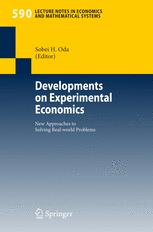

Most ebook files are in PDF format, so you can easily read them using various software such as Foxit Reader or directly on the Google Chrome browser.
Some ebook files are released by publishers in other formats such as .awz, .mobi, .epub, .fb2, etc. You may need to install specific software to read these formats on mobile/PC, such as Calibre.
Please read the tutorial at this link: https://ebookbell.com/faq
We offer FREE conversion to the popular formats you request; however, this may take some time. Therefore, right after payment, please email us, and we will try to provide the service as quickly as possible.
For some exceptional file formats or broken links (if any), please refrain from opening any disputes. Instead, email us first, and we will try to assist within a maximum of 6 hours.
EbookBell Team

5.0
58 reviewsThis volume presents papers and speeches given in the Experimental E- nomics Week in Honour of Dr Vernon L. Smith held in Okayama and Kyoto, 13-17 December 2004, which consisted of Dr Smith’s public speech and the International Conference on Experiments in Economic Sciences: New - proaches to Solving Real-world Problems. Despite having a short history, experiments are now considered indispensable in economics as in other ?elds of science and engineering. As Dr Smith’s Nobel Prize (2002) shows, experimental economics has now established itself in modern economics. In such an environment, researchers are expected to developthetraditionwithnewideasinnew?eldsforsolvingvariousproblems in the real world. The Experimental Economics Week, which was organised to explore new ?elds for experiments with new approaches, provided a unique opportunity for those who were engaged or interested in experiments in their ?elds to discuss experimental approaches from various standpoints. Economic experiments broaden and deepen our understanding of human - haviour, the economy and their interdependence. Some experiments are - signed to observe how people behave. Experimenters control subjects’ e- nomic environment to guess their strategies, which are not always apparent in the real world. The environment may be game-theoretic (a person’s gain or loss is a?ected by other persons’ actions) or non-game-theoretic. In either case what is checked is subjects’ behaviour. Some experiments are done to see how market or other economic systems work.